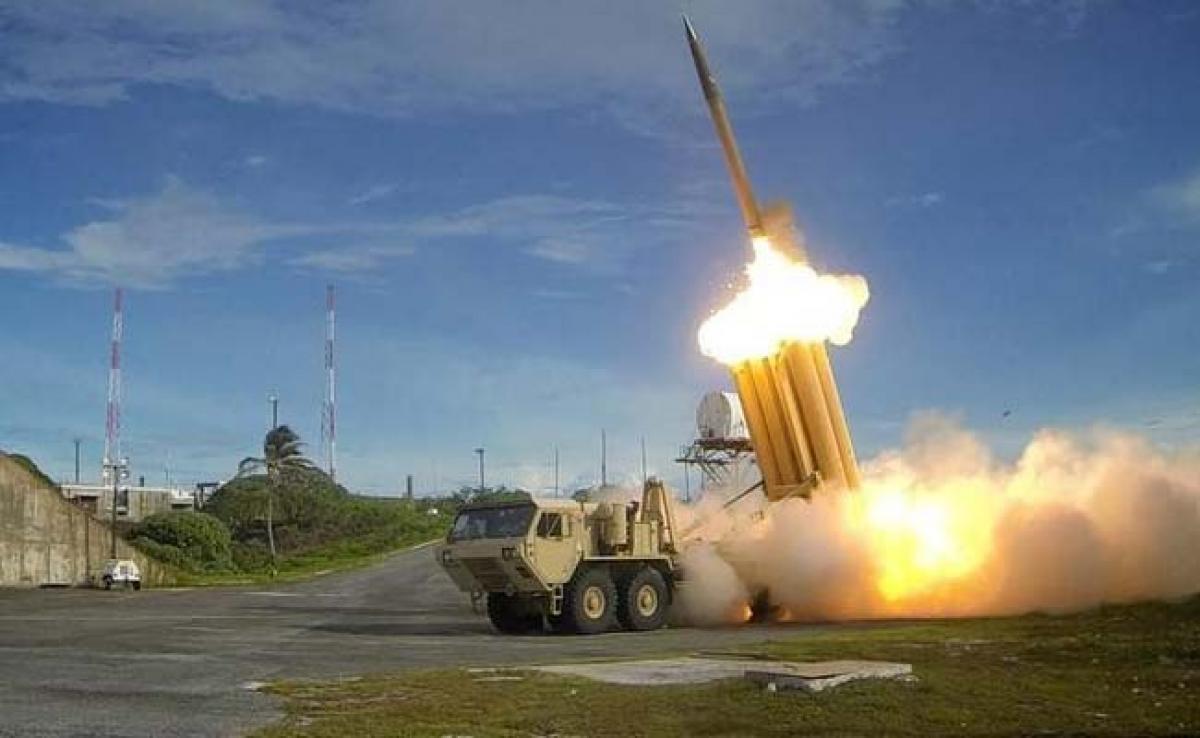Live
- TTD closes Akasaganga, Papavinasam roads
- High costs, limited results: Drone mist-spraying pilot project faces setback
- Poster war on as parties compete for voter attention
- Many dams, tanks filled as rains batter Tirupati dist
- Mayawati, Akhilesh condemn damage to Constitution replica
- Mann slams Centre over ‘one nation, one election’
- Techie suicide case: Mother-in-law flees Jaunpur home
- State government to Supreme Court: New guidelines on how to apply anti-gangster law in UP
- CM Chandrababu to unveil Vision 2047 document today in Vijayawada, traffic restrictions imposed
- State-level LIMES-2k24 inaugurated
Just In

The United States started to deploy the first elements of its advanced Terminal High Altitude Area Defense (THAAD) anti-missile system to South Korea following North Korea\'s test of four ballistic missiles, US Pacific Command said on Tuesday.
The United States started to deploy the first elements of its advanced Terminal High Altitude Area Defense (THAAD) anti-missile system to South Korea following North Korea's test of four ballistic missiles, US Pacific Command said on Tuesday.
The announcement came as North Korean state media said leader Kim Jong Un had personally supervised Monday's missile launches, stepping up threats against Washington as US troops conduct joint military exercises with South Korea.
"Continued provocative actions by North Korea, to include yesterday's launch of multiple missiles, only confirm the prudence of our alliance decision last year to deploy THAAD to South Korea," US Pacific Commander Admiral Harry Harris said in the statement.
The move by the US military is likely to deepen the brewing conflict between South Korea and China, which has angrily opposed the THAAD deployment as destroying regional security balance.
The four ballistic missiles landed in the sea off Japan's northwest, angering Seoul and Tokyo, days after North Korea promised retaliation over the military drills which it sees as preparation for war.
US President Donald Trump and Japanese Prime Minister Shinzo Abe discussed the launches during a phone call on Tuesday.
"Japan and the US confirmed that the latest North Korean missile launches were clearly against U.N. resolutions and a clear provocation against the regional and international community," Abe told reporters. "(North Korea's) threat has entered a new phase."
Trump also spoke to South Korea's acting President Hwang Kyo-ahn to discuss the North's missile launches, Hwang's office said.
"MERCILESSLY RETALIATE"
The missile test was undertaken by an army unit commissioned with attacking US military bases in Japan, the North's official KCNA news agency said.
"In the hearts of artillerymen ... there was burning desire to mercilessly retaliate against the warmongers going ahead with their joint war exercises," KCNA said.
"He (Kim) ordered the KPA Strategic Force to keep highly alert as required by the grim situation in which an actual war may break out any time, and get fully ready to promptly move, take positions and strike so that it can open fire to annihilate the enemies."
The missiles North Korea fired on Monday were unlikely to have been intercontinental ballistic missiles (ICBM), South Korea said, which can reach the United States. They flew on average 1,000 km (620 miles) and reached an altitude of 260 km (160 miles).
Some landed as close as 300 km (190 miles) from Japan's northwest coast, Japan's Defence Minister said earlier.
THAAD DEPLOYMENT
The United States and Japan have requested a United Nations Security Council meeting on the launches, which will likely be scheduled for Wednesday, diplomats said.
The planned installation of the US anti-missile defence system, which South Korea has said would be operational by the end of the year, has led to a diplomatic standoff between China and South Korea.
Chinese authorities have closed nearly two dozen retail stores of South Korea's Lotte Group that approved a land swap with the country's military last week to allow it to install the system.
China objects to the THAAD deployment, saying its territory is the target of the system's far-reaching radar. South Korea and the United States have said the missile system is aimed only at curbing North Korean provocations.

© 2024 Hyderabad Media House Limited/The Hans India. All rights reserved. Powered by hocalwire.com







